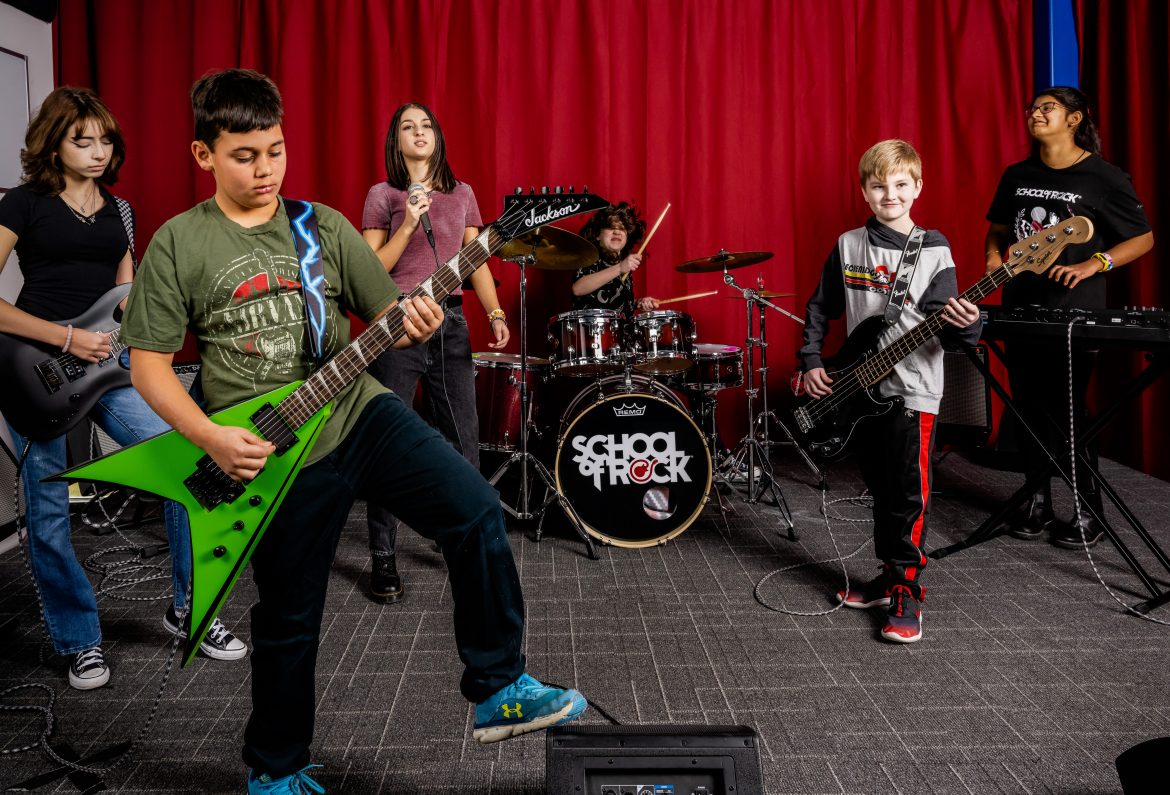Written by Lorrie Holmes
Originally published at BCParent.ca
At School Of Rock Vancouver, performance based music lessons offer these budding musicians an opportunity to build self confidence while playing their chosen musical instruments from Day One instead of starting with scales and other theory exercises. The best part is they are doing this alongside their friends in their weekly group band practice and one-on-one lessons!
It might not sound flawless at first, and that’s because it’s not supposed to be. The School of Rock’s Rock101 Program is where young performers have only just committed to their instruments of choice and are about to embark on their very own music journeys. Their paths have either begun with them recently graduating from the Rookies Program or they are between the ages of 8 to 13 and are complete beginners in their instruments. Either way, each of these students are ready to enter into the Rock101 Performance Based Program where they are now ready to practice together in combination with their weekly private lessons.
LORRIE: How does the Rock101 Program work?
MICHAEL GRANEK, General Manager & Owner: Each new season, our Rock101 students are given a new song or two to study and practice and eventually perform at our End Of Season Show. It might be something like Seven Nation Army by the White Stripes. This is what they are working towards, and along the way, our teachers will be sneaking in the music theory – not unlike what the parents at home will be doing with the veggies in their snacks!
LORRIE: How exactly do you sneak in the theory?
MICHAEL: The theory is always in there, but it’s not what we focus on at the start. We allow it to integrate naturally after we get them playing the song first, in individual lessons and in group rehearsals together with other kids. Before they know it, they are having fun while learning, and that is what we are striving for. Once they become curious and excited about the music, they are then more open to understanding the structure of these songs and how they are built. This is where our proprietary Method App comes into play. Instructors prepare different exercises for the students to practice which are then recorded for review. This way, the instructor can see if the student was able to complete the work and give them feedback on it in the next lesson. It also allows parents to be a little more hands-off.
LORRIE: We understand that you offer programs from the earliest learning in your Little Wing Program for 3 to 5 year olds right up to adult students. In this story we are focusing on your Rock101 Program where students get to join a band as part of this program. Can you tell us more about this?
MICHAEL: In this program, kids are not just learning by themselves, they’re learning with other kids playing together as a band. These kids are more likely to continue with their instrument because they are actually having fun – playing with others and not learning in isolation, helping them be more motivated to practice.
LORRIE: Do you find that this stage can actually become a bonding experience for kids and their parents?
MICHAEL: Yes. Especially when the kids start becoming curious about the songs they’re learning and begin to study on their own time. We often hear from parents that their kids are asking them questions about the band they are working on and all they seem to want to do at this point is listen to their music. It becomes a bonding experience when the kids and their parents play these albums in the car and at home and listen together.
LORRIE: I imagine it can also be a bonding experience between the students and their instructors. With the kids in this program focused on performance, it must be quite inspiring for them to learn from working musicians.
MICHAEL: Our students love learning from real musicians and really look up to them. Instructors share stories about their experiences on stage, which is a real source of inspiration but also great learning for students as they learn things like how to reduce their nerves or stage fright. For our instructors – they absolutely love watching their students’ progress and having them up on stage at the end of the season provides them with immense pride.
LORRIE: BC Parent: Tell us about how we can support our kids musically at whatever level they are at?
MICHAEL: I find that providing kids with an opportunity to explore a new skill or activity on their own will help them discover their own passions. If it’s their decision to pick what instrument they want to play, then they’re more likely to continue playing music – and not just playing, but actually ENJOYING playing that instrument. Being there cheering them on at all their shows – even when mistakes are made, that’s what is most important. An imperfect performance is part of the learning process, and the whole idea is to have fun while learning how to improve every time you perform.
“Supporting them shouldn’t be forcing them to practice, or to strive for perfection – it should be encouraging them to have joy in what they are learning, giving them the opportunity to play with other kids and grow their skills at their own pace.”
Michael Granek







TRY OUT A FREE CLASS!
The best way to experience School of Rock is to schedule a FREE trial lesson and see if it’s a good fit for your kids. Here they’ll get a tour of the studio along with a private lesson on their chosen instrument.

2837 CAMBIE STREET
VANCOUVER, BRITISH COLUMBIA V5Z 3Y8
schoolofrock.com/locations/vancouver
778-561-4261
This story is sponsored by TEACHING THROUGH STORIES & SONGS


FREE GOURD BINGO GAME!
SUBSCRIBE BELOW to Kids News & Reviews and you’ll instantly receive our FREE Gourd Bingo Game — the perfect seasonal activity for circle time, dramatic play, or family fun!


